
HEALTH CARE ANALYSIS
Scope & Guideline
Advancing insights into healthcare complexities.
Introduction
Aims and Scopes
- Ethical Considerations in Health Care:
The journal emphasizes the ethical implications of health care decisions, exploring issues such as informed consent, patient autonomy, and moral dilemmas faced by health care professionals. - Social Justice and Health Equity:
A core focus is on addressing health disparities and advocating for equitable health care access for marginalized populations, reflecting a commitment to social justice within health systems. - Interdisciplinary Approaches to Health Policy:
The journal encourages interdisciplinary research that integrates insights from law, philosophy, sociology, and public health to analyze health care policies and their societal impacts. - Patient-Centered Care:
A significant area of interest includes the dynamics of the doctor-patient relationship, advocating for models that prioritize patient involvement and shared decision-making. - Impact of Technology on Health Care:
The journal examines the ethical implications of emerging health technologies, including telemedicine, digital health tools, and their influence on clinical practice and patient care.
Trending and Emerging
- Ethics of Digital Health Technologies:
There is an increasing focus on the ethical implications of digital health technologies, including data privacy, informed consent in telemedicine, and the impact of artificial intelligence on clinical decision-making. - Health Disparities and Social Justice:
Emerging themes emphasize the ethical and social justice dimensions of health disparities, with a growing body of work addressing the intersection of race, gender, and socioeconomic status in health care access. - Patient Empowerment and Shared Decision-Making:
A trend towards exploring patient empowerment, emphasizing the importance of involving patients in their care decisions, has gained momentum, reflecting a shift towards more participatory health care models. - Environmental and Public Health Ethics:
The journal is increasingly addressing the ethical implications of environmental health issues, including climate change's impact on health and the ethical responsibilities of health care systems towards sustainability. - The Role of Trust in Health Care Relationships:
An emerging focus on the role of trust in patient-provider relationships highlights the need for ethical frameworks that foster trust and transparency in health care interactions.
Declining or Waning
- Traditional Medical Ethics:
There has been a noticeable decrease in discussions surrounding traditional medical ethics frameworks, as the journal has shifted towards more contemporary issues such as technology's role in health care. - Pharmaceutical Ethics:
Papers specifically addressing pharmaceutical ethics and the pharmaceutical industry’s role in health care decision-making have become less frequent, possibly due to a broader focus on systemic health issues. - Public Health Paradigms:
While public health remains a critical area, specific discussions around historical public health paradigms and their ethical implications seem to be waning in favor of more innovative approaches to health care challenges.
Similar Journals
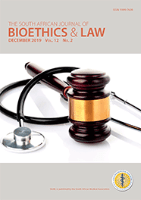
South African Journal of Bioethics and Law
Exploring the crossroads of ethics and law in healthcare.South African Journal of Bioethics and Law, published by HEALTH & MEDICAL PUBLISHING GROUP, stands as a vital academic platform for discussions at the intersection of bioethics and legal studies. With an ISSN of 1999-7639, this journal has embraced an Open Access model since 2008, ensuring global accessibility for researchers, practitioners, and students alike. Based in South Africa, the journal operates from PRIVATE BAG X1, PINELANDS, CAPE TOWN 7430, and features diverse articles that span a multitude of pertinent topics across health professions, law, and public health. It proudly holds a Q3 ranking in Health Professions and Law sectors, affirming its status within the scholarly community. Notably, for the year 2023, it has achieved impressive placements in Scopus ranks, reinforcing its commitment to disseminating high-quality research and fostering dialogues that influence policy and practice in these critical domains. Researchers exploring the intricate ethical and legal dimensions of healthcare will find this journal an indispensable resource.
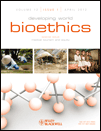
Developing World Bioethics
Navigating the intersection of ethics and healthcare.Developing World Bioethics, published by WILEY, is an esteemed journal dedicated to the exploration and advancement of ethical issues in health and healthcare within developing countries. Since its inception in 2001, this journal has become a critical platform for disseminating scholarly research and discourse that address complex bioethical challenges in varied socio-economic contexts. With an impressive Q2 ranking in multiple categories, including Health Policy and Issues, Ethics and Legal Aspects, it stands out as a vital resource among its peers, boasting significant Scopus rankings that highlight its influence and contribution to the fields of health and social sciences. The journal is committed to fostering interdisciplinary dialogue and insight, making it an invaluable asset for researchers, professionals, and students keen on bioethics and health policy. While the journal operates on a subscription basis, it provides broad access to its diverse range of articles, ensuring that cutting-edge bioethical perspectives are available to stakeholders worldwide, with a focus on innovative solutions and best practices in healthcare systems globally.

Ethik in der Medizin
Fostering Interdisciplinary Dialogue on Health EthicsEthik in der Medizin, published by Springer, is a distinguished journal focusing on the interdisciplinary aspects of ethics in medicine, healthcare policy, and philosophical inquiries related to these domains. With an ISSN of 0935-7335 and an E-ISSN of 1437-1618, this journal serves as a platform for innovative research and discussion from Germany and beyond. The journal boasts an impact in several prestigious categories including Q3 in Health Policy and Q2 in Philosophy as of 2023, reflecting its significant contribution to the discourse on ethical implications in health and medicine. Although not currently Open Access, Ethik in der Medizin provides valuable insights for researchers, professionals, and students interested in the complexities of health ethics and policies, positioning itself as an essential resource in academia. The journal is undergoing important developments, as it converges from 2001 with a publishing timeline extending to 2024, ensuring continued relevance in a rapidly evolving field.
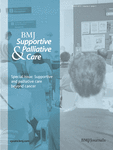
BMJ Supportive & Palliative Care
Championing excellence in palliative research.BMJ Supportive & Palliative Care is a leading academic journal dedicated to advancing the field of supportive and palliative care, published by the esteemed BMJ PUBLISHING GROUP in the United Kingdom. With an ISSN of 2045-435X and an E-ISSN of 2045-4368, this journal showcases high-quality, peer-reviewed articles that cater to a diverse audience, including healthcare professionals, researchers, and students. Notably, it holds a commendable impact factor, reflecting its credibility and influence within the academic community. As of 2023, the journal ranks in the top quartile (Q1) for Medical and Surgical Nursing and holds prestigious positions in the Q2 category for Medicine (miscellaneous) and Oncology (nursing), demonstrating its significance in multiple disciplines. Research published in this journal aims to enhance patient-centered care practices and improve health outcomes, making it an invaluable resource for innovative studies and discussions in the field. With a commitment to open access principles, BMJ Supportive & Palliative Care serves as a pivotal platform for disseminating knowledge and supporting the ongoing professional development of its readership.

Acta Bioethica
Navigating the Complexities of Healthcare EthicsActa Bioethica is a pivotal open access journal published by the Universidad de Chile's Centro Interdisciplinario de Estudios Bioética, dedicated to the multidisciplinary exploration of bioethical issues in health policy and social sciences. Since its inception in 2000, the journal has fostered dialogue among researchers, professionals, and students, addressing the complexities of ethical practices in diverse health contexts. With an impressive commitment to accessibility, Acta Bioethica has become a vital resource for those engaged in understanding the ethics of healthcare in Latin America and beyond. Although currently ranked in the lower quartiles of Scopus in both health policy and social sciences, the journal is steadily gaining recognition for its unique contributions to bioethics. The journal accepts contributions in both English and Spanish, ensuring a wider reach and impact in the academic community. Located in Santiago, Chile, and active from 2007 to 2024, Acta Bioethica continues to be an essential platform for advancing research and discussions in the ever-evolving field of bioethics.
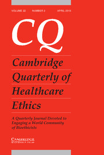
CAMBRIDGE QUARTERLY OF HEALTHCARE ETHICS
Exploring the Intersection of Ethics and Health Policy.CAMBRIDGE QUARTERLY OF HEALTHCARE ETHICS is a premier journal published by Cambridge University Press, focusing on significant issues at the intersection of healthcare, ethics, and policy. With an ISSN of 0963-1801 and an E-ISSN of 1469-2147, this journal serves as a vital platform for discourse among researchers, practitioners, and scholars in the health social sciences. Emphasizing vital ethical considerations in healthcare practices and policies, it ranks in the Q3 tier for Health Policy and Q2 for both Health (Social Science) and Issues, Ethics, and Legal Aspects according to the 2023 journal category quartiles. The journal, spanning its tenure from 1992 to 2024, features rigorous peer-reviewed articles that contribute to the advancement of ethical standards in healthcare. By addressing contemporary ethical dilemmas and promoting scholarly dialogue, CAMBRIDGE QUARTERLY OF HEALTHCARE ETHICS remains an essential resource for those committed to understanding the complexities and ethical implications inherent in health systems today.

AMERICAN JOURNAL OF BIOETHICS
Leading the conversation on contemporary bioethical dilemmas.American Journal of Bioethics (ISSN: 1526-5161, E-ISSN: 1536-0075) is a premier publication in the field of bioethics, published by Routledge Journals, Taylor & Francis Ltd, renowned for its commitment to advancing scholarly discourse. Established in 2001, the journal is positioned at the forefront of ethical discussions in healthcare, evidenced by its impressive Q1 rankings in both Health Policy and Issues, Ethics, and Legal Aspects in 2023. With an emphasis on high-impact research, it holds a prestigious Scopus Rank of #1/46 in Nursing and #9/310 in Medicine, showcasing its significance in shaping bioethical considerations. Though not classified as an open access journal, its contents are integral for researchers, practitioners, and students engaged in ethical policymaking and advocacy. By addressing contemporary ethical dilemmas and legal nuances within healthcare, the American Journal of Bioethics serves as an essential resource for fostering an informed dialogue and influencing policy development across the globe.
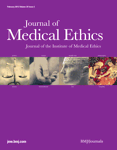
JOURNAL OF MEDICAL ETHICS
Championing Ethical Standards in MedicineJOURNAL OF MEDICAL ETHICS, published by the esteemed BMJ PUBLISHING GROUP, is a leading journal that has been pivotal in advancing the discourse on ethical issues in healthcare since its inception in 1975. This UK-based journal, with an ISSN of 0306-6800 and an E-ISSN of 1473-4257, is well-regarded for its high-quality, peer-reviewed articles that delve into the complex moral dimensions surrounding medical practices, health policies, and social sciences. With a commendable impact, JOURNAL OF MEDICAL ETHICS has achieved Q1 quartile rankings across multiple categories, including Arts and Humanities and Health Policy in 2023, reflecting its significant influence and relevance in the field—ranked #23 of 552 in Arts and Humanities (Miscellaneous) with a 95th percentile, and #26 in Health Policy with a 91st percentile. Researchers, professionals, and students alike can benefit from the journal's commitment to fostering a deeper understanding of ethical considerations vital to the medical community, although it currently does not offer open access options. The journal's comprehensive examination of issues, ethics, and legal aspects continues to make it an essential resource for those dedicated to shaping the ethical landscape of healthcare.
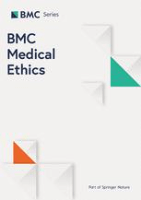
BMC Medical Ethics
Shaping the future of medical ethics through open dialogue.BMC Medical Ethics is a leading open-access journal dedicated to the critical exploration and dissemination of knowledge surrounding ethical issues in healthcare and medicine. Published by BMC, and headquartered in the United Kingdom, this journal has become a cornerstone in the field since its inception in 2000, with a remarkable focus on health policy, nursing ethics, and the complex legal aspects intertwining with healthcare practices. With an impressive Q1 ranking across multiple categories, including Health Policy and Health (Social Science), it ranks among the top journals globally—particularly notable with its Scopus rankings reflecting a strong 85th percentile in Nursing and an 81st percentile in Social Sciences. As an open-access publication, BMC Medical Ethics ensures that research findings are readily accessible, fostering a collaborative environment for researchers, practitioners, and students alike. The journal's commitment to ethical discourse not only advances academic inquiry but also shapes the practices and policies that govern healthcare delivery; thus, making it an invaluable resource for those engaged in the advancement of medical ethics.
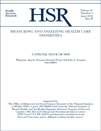
HEALTH SERVICES RESEARCH
Advancing health policy through rigorous research.HEALTH SERVICES RESEARCH, published by Wiley, is a premier journal focused on advancing the field of health policy and services research. With an ISSN of 0017-9124 and an impressive E-ISSN of 1475-6773, this esteemed publication has been at the forefront of health services inquiry since its inception in 1966. Recognized as a Q1 journal in Health Policy for 2023, it ranks #80 out of 310 in Scopus, placing it in the 74th percentile, underlining its significant influence in the field. The journal caters to a global audience of researchers, practitioners, and students by providing a platform for rigorous empirical studies and critical reviews that aim to improve health care delivery and policy outcomes. Although it does not offer open access, the comprehensive articles and insights published within its pages are essential for anyone seeking to understand and influence health systems. With its convergence towards the year 2024, HEALTH SERVICES RESEARCH continues to be a vital resource for those dedicated to enhancing healthcare effectiveness and accessibility.